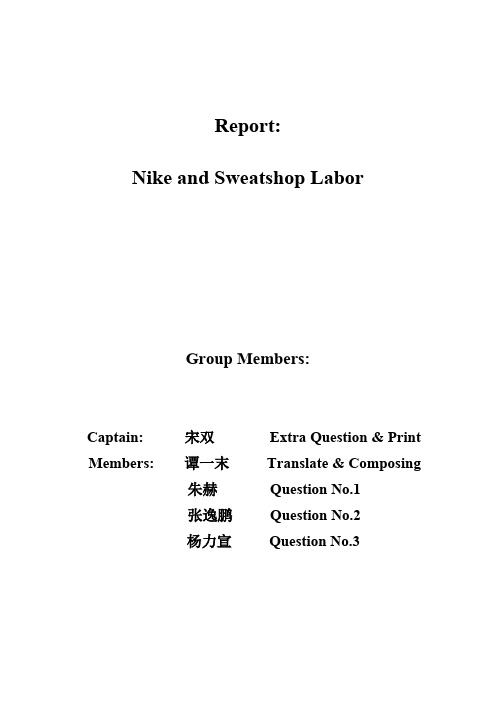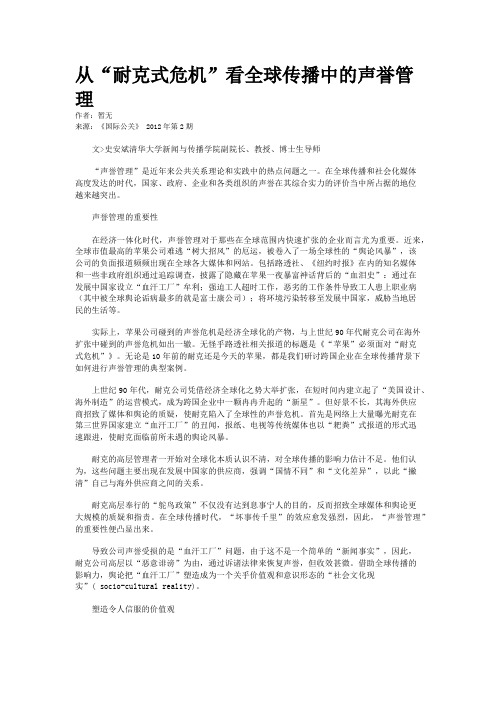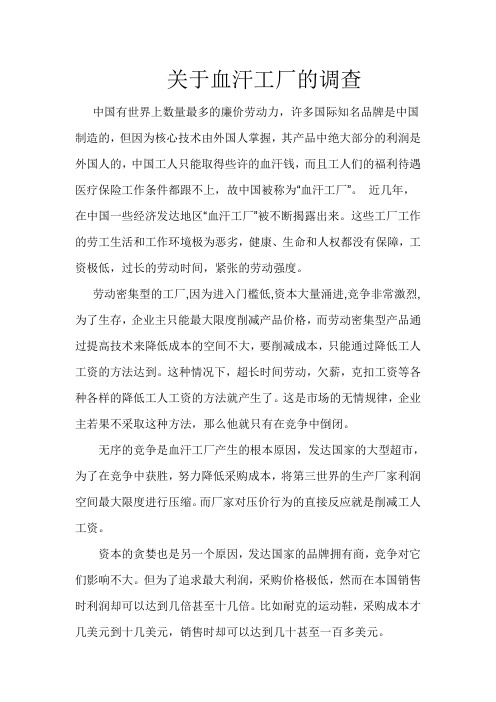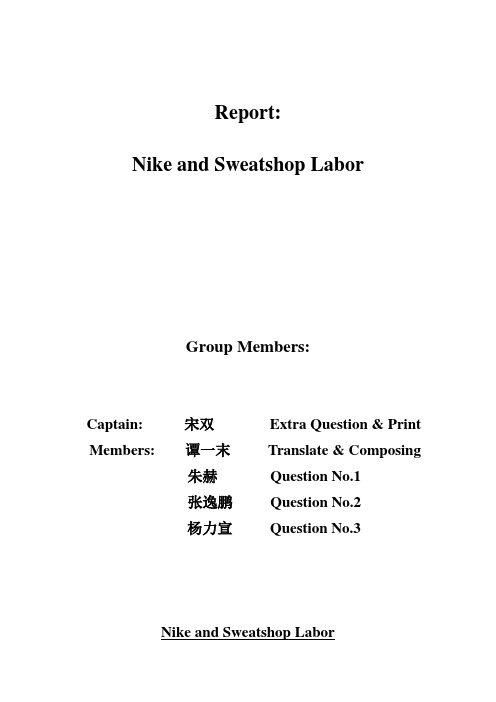管理咨询案例分析:耐克“血汗工厂”事件
(完整版)耐克血汗工厂案例答案

Report:Nike and Sweatshop LaborGroup Members:Captain: 宋双Extra Question & Print Members: 谭一末Translate & Composing朱赫Question No.1张逸鹏Question No.2杨力宣Question No.3Nike and Sweatshop LaborNike, a company headquartered in Beaverton, Oregon, is a major force in the sports footwear and fashion industry, with annual sales exceeding $12 billion, more than half of which now come from outside the United States. The company was co-founded in 1964 by Phil Knight, a CPA at Price Waterhouse, and Bill Bowerman, college track coach, each investing $500 to start. The company, initially called Blue Ribbon Sports, changed its name to Nike in 1971 and adopted the “Swoosh” logo-recognizable around the world-originally designed by a college student for $35. Nike became highly successful in designing and marketing mass-appealing products such as the Air Jordan, the best selling athletic shoe of all time.Nike has no production facilities in the United States. Rather, the company manufactures athletic shoes and garments in such Asian countries as China, Indonesia, and Vietnam using subcontractors, and sells the products in the U.S. and international markets. In each of those Asian countries where Nike has production facilities, the rates of unemployment and under-employment are quite high. The wage rate is very low in those countries by U.S. standards-the hourly wage rate in the manufacturing sector is less than $1 in each of those countries, compares with about $20 in the United States. In addition, workers in those countries often operate in poor and unhealthy environments and their rights are not particularly well protected. Understandably, host countries are eager to attract foreign investments like Nike’s to develop their economies and raise the living standards of their citizens. Recently, however, Nike came under worldwide criticism for its practice of hiring workers for such a low rate of pay-“next to nothing” in the words of critics-and condoning poor working conditions in host countries.Initially, Nike denied the sweatshop charges and lashed out at critics. But later, the company began monitoring the labor practices at its overseas factories and grading the factories in order to improve labor standards. Nike also agreed to random factory inspections by disinterested parties.Do you think the criticism of Nike is fair, considering that the host countries are in dire needs of creating jobs?Obviously, Nike’s investments in such Asian countries as China, Indonesia, and Vietnam were motivated to take advantage of low labor costs in those countries. While Nike was criticized for the poor working conditions for its workers, the company has recognized the problem and has substantially improved the working environments recently. Although Nike’s workers get paid very low wages by the Western standard, they probably are making substantially more than their local compatriots who are either under- or unemployed. While Nike’s detractors may have valid points, one should not ignore the fact that the company is making contributions to the economic welfare of those Asian countries by creating job opportunities.What do you think Nike’s executives might have done differently to prevent the sensitive charges of sweatshop labor in overseas factories?Internal operation:•Improve the working condition, increase employees’ income and raise the minimum employment age;External operations:•Public Relationship: Nike should invite some social figures who at least hold moderate attitude towards this issue to inspect their factories and makeadvantageous comments on it;•OEM Standard: The so-called “sweat factory” refers to OEMs instead of Nike headquarter. Nike is only responsible for designing and selling shoes,and outsourcers the parts production and assembly work to OEMs. Nike mayset some standards to OEMs on payments and working conditions, etc. Onlythose who have met the standards can cooperate with Nike;•Corporate Image: Nike can promote their positive popularity and improve their image by subsidizing schools and other NGOs, as well as taking part inmore charity activities for the sake of reducing the bad influence on this issue.Do firms need to consider the co-called corporate social responsibilities in making in investment decisions?Yes. Because “corporate social responsibilities” are not only aiming at maximizing the profit of shareholders, but also in charge of caring and increasing other social interests at the maximum extent, including interests of consumers, employees, creditor, small and medium-sized competitors, local communities, environment, so long as the total social public interests, and so forth. So that as a globally reputed enterprise, Nike not only has to consider their profits, but also take their social obligations into consideration when it is going to make investment decisions. Nike should care about other social interests, especially of those exploited overseas workers. By taking these steps, Nike would response to the questions, establish positive image and take their social responsibilities.Extra Question:What’re the advantages and disadvantages to those cheap-labor countries like China that MNC set their factory in their countries?Advantages:•Increase capital for these countries and partial interests for governments;•Boost employment opportunities and tax revenue.Disadvantages:•Bring competition to the local corporations;•Exploit local labor.。
苹果公司血汗工厂的案例分析

苹果公司血汗工厂的案例分析关于血汗工厂的案例分析案例截止2011年12月,苹果公司的销售额大涨73%,至436美元,利润则翻了一倍多,至131亿美元,这一业绩使得苹果的现金储备达到了976亿美元。
苹果公司在业绩上成为了当之无愧的销售之王,但同时,它还有另一个名字:血汗工厂。
众所周知,苹果本身不设工厂,而是通过招收供应商的方式生产产品。
这些法律上受苹果公司一定程度管制的工厂却被外界称为“血汗工厂”,因为苹果的每一个产品都是建立在工人的血汗之上的。
包括每日超过10小时的工作时间,恶劣的工作环境,繁重的工作任务,导致工人如机器般生活着。
这些情况直接导致了富士康10连跳事件和137名工人因用有毒的正己烷清洁IPone屏幕使神经系统受到损伤,以及在2011年7月,两家制造iPad 的工厂发生了类似的铝粉爆炸事件,导致4人遇难,77人受伤。
这些把生命压低到生产线之下的现象持续存在着,而供应商与苹果公司却都没有彻底整改的意思。
对于供应商而言,每年世界各地工厂负责人都会飞往苹果公司总部或者邀请苹果高层来工厂参观以展现其高效的生产线、先进的生产设备,只为获得苹果高额的合同单。
对于苹果公司而言,一旦因为整改工人工作环境而与核心供应商发生冲突,可能会影响到新产品出工的速度,从而威胁其竞争优势,因此苹果给出的回应总是:我们只是在遵守当地的规定。
理论对于企业而言,其目标是运用有限的资本,通过生产经营活动,以取得最大的利润。
利润是收益减去成本,成本是指商品生产活动中所使用的生产要素的价值。
成本又分为固定成本和可变成本,可变成本指企业短时期为可以改变的那些可变投入要素所带来的成本,通常包括工人工资、原材料成本等。
可变成本越低,成本越低,利润越大。
故压低成本是企业获取巨额利润的有效途径之一。
案例分析在上述案例中,工人权益与企业利益形成了矛盾。
要具体分析血汗工厂存在的原因,需从苹果公司与代工工厂两个角度看待问题。
通过代工工厂,苹果一年能省下多少成本?以富士康工厂为例,一名大专毕业的工人工资为22美元,含加班费,一天工作12小时,而一位美国工人,一天工作8小时,每小时工资为8美元。
耐克企业社会责任案例

总体评价
前瞻的、理性的、成功的、可持续发展的战略选择
第十八页,编辑于星期二:八点 五十五分。
四.耐克(NIKE)供应链管理
起源 发展 现状 未来发展趋势 存在的主要问题 耐克采取的行动 相关标准 执行团队
耐克(NIKE)供应链管理
无心插柳柳成荫 成也萧何、败也萧何 数十个国家和地区、八百余家工厂、近百万工人 调整、巩固、充实、提高
耐克(NIKE)成立之初相当长的时间内(上世纪70、80年代),把主要精力投入到设计和销 售上,选择在低人力成本国家开辟代工厂商(先在日本生产,后来转移到韩国和台湾),这一堪 称业界革命性的创举成就了耐克高人一筹的核心竞争力,而生产外包也成为了耐克商业模 式的核心;在这一阶段耐克策略焦点集中于: 1、建立最好的海外生产运作模式;
城市流动儿童(打工子弟学校学生) 在民工子弟学校开展系列体育活动、举行体育教师培训、开发体育游戏课
程、分发体育资源包等。 中国儿童少年基金会 现金+产品
鼓励企业员工作为志愿者参与 第二十一页,编辑于星期二:八点 五十五分。
五.耐克(NIKE)公益事业 2、耐克“让我玩”公益项目评析(2)
类别
资金及活动规模 模式创新
从血汗工厂到企业公民 从企业公民到全面领先
耐克企业社会责任案例分享
第一页,编辑于星期二:八点 五十五分。
目录
一.耐克(NIKE)企业社会责任发展进程概述 二.耐克(NIKE)企业社会责任体系介绍 三.耐克(NIKE)环保设计 四.耐克(NIKE)供应链管理 五.耐克(NIKE)公益事业
第二页,编辑于星期二:八点 五十五分。
2、耐克Considered体系简介(2)
耐克Considered体系
执行团队
从“耐克式危机”看全球传播中的声誉管理

从“耐克式危机”看全球传播中的声誉管理作者:暂无来源:《国际公关》 2012年第2期文>史安斌清华大学新闻与传播学院副院长、教授、博士生导师“声誉管理”是近年来公共关系理论和实践中的热点问题之一。
在全球传播和社会化媒体高度发达的时代,国家、政府、企业和各类组织的声誉在其综合实力的评价当中所占据的地位越来越突出。
声誉管理的重要性在经济一体化时代,声誉管理对于那些在全球范围内快速扩张的企业而言尤为重要。
近来,全球市值最高的苹果公司难逃“树大招风”的厄运,被卷入了一场全球性的“舆论风暴”,该公司的负面报道频频出现在全球各大媒体和网站。
包括路透社、《纽约时报》在内的知名媒体和一些非政府组织通过追踪调查,披露了隐藏在苹果一夜暴富神话背后的“血泪史”:通过在发展中国家设立“血汗工厂”牟利;强迫工人超时工作,恶劣的工作条件导致工人患上职业病(其中被全球舆论诟病最多的就是富士康公司);将环境污染转移至发展中国家,威胁当地居民的生活等。
实际上,苹果公司碰到的声誉危机是经济全球化的产物,与上世纪90年代耐克公司在海外扩张中碰到的声誉危机如出一辙。
无怪乎路透社相关报道的标题是《“苹果”必须面对“耐克式危机”》。
无论是10年前的耐克还是今天的苹果,都是我们研讨跨国企业在全球传播背景下如何进行声誉管理的典型案例。
上世纪90年代,耐克公司凭借经济全球化之势大举扩张,在短时间内建立起了“美国设计、海外制造”的运营模式,成为跨国企业中一颗冉冉升起的“新星”。
但好景不长,其海外供应商招致了媒体和舆论的质疑,使耐克陷入了全球性的声誉危机。
首先是网络上大量曝光耐克在第三世界国家建立“血汗工厂”的丑闻,报纸、电视等传统媒体也以“耙粪”式报道的形式迅速跟进,使耐克面临前所未遇的舆论风暴。
耐克的高层管理者一开始对全球化本质认识不清,对全球传播的影响力估计不足。
他们认为,这些问题主要出现在发展中国家的供应商,强调“国情不同”和“文化差异”,以此“撇清”自己与海外供应商之间的关系。
关于血汗工厂的调查

关于血汗工厂的调查中国有世界上数量最多的廉价劳动力,许多国际知名品牌是中国制造的,但因为核心技术由外国人掌握,其产品中绝大部分的利润是外国人的,中国工人只能取得些许的血汗钱,而且工人们的福利待遇医疗保险工作条件都跟不上,故中国被称为“血汗工厂”。
近几年,在中国一些经济发达地区“血汗工厂”被不断揭露出来。
这些工厂工作的劳工生活和工作环境极为恶劣,健康、生命和人权都没有保障,工资极低,过长的劳动时间,紧张的劳动强度。
劳动密集型的工厂,因为进入门槛低,资本大量涌进,竞争非常激烈,为了生存,企业主只能最大限度削减产品价格,而劳动密集型产品通过提高技术来降低成本的空间不大,要削减成本,只能通过降低工人工资的方法达到。
这种情况下,超长时间劳动,欠薪,克扣工资等各种各样的降低工人工资的方法就产生了。
这是市场的无情规律,企业主若果不采取这种方法,那么他就只有在竞争中倒闭。
无序的竞争是血汗工厂产生的根本原因,发达国家的大型超市,为了在竞争中获胜,努力降低采购成本,将第三世界的生产厂家利润空间最大限度进行压缩。
而厂家对压价行为的直接反应就是削减工人工资。
资本的贪婪也是另一个原因,发达国家的品牌拥有商,竞争对它们影响不大。
但为了追求最大利润,采购价格极低,然而在本国销售时利润却可以达到几倍甚至十几倍。
比如耐克的运动鞋,采购成本才几美元到十几美元,销售时却可以达到几十甚至一百多美元。
58.82%的同学认为有关部门的不作为导致了血汗工厂的产生,对此有关部门应负主要责任,41.18%的被调查者认为代工厂应负主要责任。
从调查中我们可以看到,网友们都认为是这两方应为此类事件负全责。
血汗工厂中包含的马克思主义的经济原理剩余价值在私有经济的资本家面前就是一切,只要有私营经济存在,人的本性决定一个人从普通人转而成为资本家后就产生了质的变化,这是人的劣根性使然,这在任何社会制度下都一样,剥削的程度取决于社会的腐败程度.工人的工作时间长,工资待遇低,拖欠和克扣工资现象严重,工作条件非常差等等。
公共关系案例分析

沃尔玛的应对策略
立即启动应急预案,组织救援人员和物 资,控制火势蔓延。
开展灾后重建工作,尽快恢复营业,为 当地居民提供必要的帮助和服务。
积极与媒体合作,提供采访和报道机会 ,展示公司关心和关注的态度。
迅速与当地政府和相关部门取得联系, 协调救援工作。
及时向公众发布事件进展信息,保持透 明度和公开性。
THANKSຫໍສະໝຸດ 0302采取补救措施
积极配合调查
特斯拉积极配合相关部门进行调查 ,并公开接受媒体和公众的监督。 他们承诺将全力查明事故原因,并 采取措施确保类似事件不再发生。
为了缓解公众的担忧,特斯拉宣 布暂停使用涉事车辆的自动驾驶 功能,并推出了一项软件更新, 加强了车辆的安全性能。此外, 他们还为受影响的用户提供了额 外的服务和支持。
企业应对危机进行全面 评估,深入分析危机产 生的原因及影响,制定 合理的应对策略。
企业应将公共关系建设 作为长期战略,注重品 牌形象和声誉管理,提 高企业的综合竞争力。
对于企业公共关系建设的建议
建立危机应对机制
企业应建立健全的危机应对机制,制定危 机处理流程,提高危机应对能力。
增强公关意识
企业应加强员工的公关意识培训,提高员 工的公关素质和应对能力。
事件背景
2000年代初,媒体开始爆出关于耐克公司在东南亚的代工厂中存在工 人权益受损,工作环境恶劣的“血汗工厂”指控。
指控称,这些工厂中的工人,尤其是童工,被迫在极端恶劣的环境下工 作,以换取微薄的工资,有些工人的收入甚至不足以维持基本生活。
这一事件引起了公众的广泛关注和批评,对耐克的形象产生了严重负面 影响。
《公共关系案例分析》
2023-10-31
目录
• 案例一:沃尔玛应对商店火灾 • 案例二:特斯拉汽车公司的危机公关 • 案例三:星巴克咖啡公司的社会责任公关 • 案例四:耐克公司应对“血汗工厂”的指控 • 总结与启示 • 参考文献
耐克:关于血汗工厂的争论

耐克:关于血汗工厂的争论口引言从很多方面来讲,耐克公司都可被称为一家完美的全球公司。
耐克公司是在1972年由一位名叫菲尔·奈特(Phil Knight)的前俄勒冈大学田径明星创立的,目前该公司已成为世界上经营运动鞋和运动服饰的领军企业。
2()06年,该公司的年销售额达150亿美元,产品销往140个国家。
耐克公司不搞任何生产,它只是设计和销售它的产品,其生产则是通过与分布在全世界的60()多家工厂签订合约来完成的,这些工厂在全球所雇用的工人总计约为65万人。
这一巨型公司使奈特成为美国最大的富翁之一。
耐克公司那句著名的广告语“Just Do It!”已成为流行文化的标志,就如它的标识,或它的广告代言人迈克尔·乔丹和老虎伍兹的形象一样。
而与其所有的成功相伴的,则是该公司十多年来一直饱受其产品产自血汗工厂的诟病。
在这些血汗工厂中,工人们(其中有许多还只是孩子)在极其恶劣的条件下像奴隶一般的工作,而所得报酬却微乎其微。
批评它的人声称,耐克公司的财富是积累在世界穷人的脊梁之上的。
在许多人的眼里,耐克已成为全球化灾难的一种象征——一家富裕的西方公司通过对全世界穷人的剥削,从而向发达国家那些被宠坏了的顾客提供昂贵的鞋子和服饰。
耐克公司的“耐克小镇”已成为反全球化示威者的典型目标。
几个非政府组织,如设在旧金山的一个人权组织——Global Exchange,宣称要促进世界范围的环境、政治和社会公正——一直将耐克作为其持续批评和抗议的目标。
一些新闻媒体,如CBS由丹·拉瑟主持的《48小时》节目揭露了那些向耐克供货的外国工厂的工作场景。
在几家受到耐克公司资助的美国大学校园里,学生们公开抗议学校与耐克之间的联系,指责耐克公司使用血汗工厂劳动力,耐克公司方面也采取了若干措施来应对这些抗议。
它承认有些海外工厂确实存在问题,但公司承诺要改善工作条件。
它要求外国分包商必须满足起码的工作条件和薪酬待遇,安排了独立的审计人员对这些工厂进行检查,还终止了与那些不合格工厂的合约关系。
耐克血汗工厂案例答案

Report:Nike and Sweatshop LaborGroup Members:Captain: 宋双Extra Question & Print Members: 谭一末Translate & Composing朱赫Question No.1张逸鹏Question No.2杨力宣Question No.3Nike and Sweatshop LaborNike, a company headquartered in Beaverton, Oregon, is a major force in the sports footwear and fashion industry, with annual sales exceeding $12 billion, more than half of which now come from outside the United States. The company was co-founded in 1964 by Phil Knight, a CPA at Price Waterhouse, and Bill Bowerman, college track coach, each investing $500 to start. The company, initially called Blue Ribbon Sports, changed its name to Nike in 1971 and adopted the “Swoosh”logo-recognizable around the world-originally designed by a college student for $35. Nike became highly successful in designing and marketing mass-appealing products such as the Air Jordan, the best selling athletic shoe of all time.Nike has no production facilities in the United States. Rather, the company manufactures athletic shoes and garments in such Asian countries as China, Indonesia, and Vietnam using subcontractors, and sells the products in the U.S. and international markets. In each of those Asian countries where Nike has production facilities, the rates of unemployment and under-employment are quite high. The wage rate is very low in those countries by U.S. standards-the hourly wage rate in the manufacturing sector is less than $1 in each of those countries, compares with about $20 in the United States. In addition, workers in those countries often operate in poor and unhealthy environments and their rights are not particularly well protected. Understandably, host countries are eager to attract foreign investments like Nike’s to develop their economies and raise the living standards of their citizens. Recently, however, Nike came under worldwide criticism for its practice of hiring workers for such a low rate of pay-“next to nothing” in the words of critics-and condoning poor working conditions in host countries.Initially, Nike denied the sweatshop charges and lashed out at critics. But later, the company began monitoring the labor practices at its overseas factories and grading the factories in order to improve labor standards. Nike also agreed to random factory inspections by disinterested parties.Discussion Points:Do you think the criticism of Nike is fair, considering that the host countries are in dire needs of creating jobs?Obviously, Nike’s investments in such Asian countries as China, Indonesia, and Vietnam were motivated to take advantage of low labor costs in those countries. While Nike was criticized for the poor working conditions for its workers, the company has recognized the problem and has substantially improved the working environments recently. Although Nike’s workers get paid very low wages by the Western standard, they probably are making substantially more than their local compatriots who are either under- or unemployed. While Nike’s detractors may have valid points, one should not ignore the fact that the company is making contributions to the economic welfare of those Asian countries by creating job opportunities.Discussion Points:What do you think Nike’s executives might have done differently to prevent the sensitive charges of sweatshop labor in overseas factories?➢Internal operation:•Improve the working condition, increase employees’income and raise the minimum employment age;➢External operations:•Public Relationship: Nike should invite some social figures who at least hold moderate attitude towards this issue to inspect their factories and makeadvantageous comments on it;•OEM Standard: The so-called “sweat factory”refers to OEMs instead of Nike headquarter. Nike is only responsible for designing and selling shoes,and outsourcers the parts production and assembly work to OEMs. Nike mayset some standards to OEMs on payments and working conditions, etc. Onlythose who have met the standards can cooperate with Nike;•Corporate Image: Nike can promote their positive popularity and improve their image by subsidizing schools and other NGOs, as well as taking part inmore charity activities for the sake of reducing the bad influence on thisissue.Discussion Points:Do firms need to consider the co-called corporate social responsibilities in making in investment decisions?Yes. Because “corporate social responsibilities” are not only aiming at maximizing the profit of shareholders, but also in charge of caring and increasing other social interests at the maximum extent, including interests of consumers, employees, creditor, small and medium-sized competitors, local communities, environment, so long as the total social public interests, and so forth. So that as a globally reputed enterprise, Nike not only has to consider their profits, but also take their social obligations into consideration when it is going to make investment decisions. Nike should care about other social interests, especially of those exploited overseas workers. By taking these steps, Nike would response to the questions, establish positive image and take their social responsibilities.Extra Question:What’re the advantages and disadvantages to those cheap-labor countries like China that MNC set their factory in their countries?➢Advantages:•Increase capital for these countries and partial interests for governments;•Boost employment opportunities and tax revenue.➢Disadvantages:•Bring competition to the local corporations;。
- 1、下载文档前请自行甄别文档内容的完整性,平台不提供额外的编辑、内容补充、找答案等附加服务。
- 2、"仅部分预览"的文档,不可在线预览部分如存在完整性等问题,可反馈申请退款(可完整预览的文档不适用该条件!)。
- 3、如文档侵犯您的权益,请联系客服反馈,我们会尽快为您处理(人工客服工作时间:9:00-18:30)。
据2005年中国国际广播电台报道,全球最大的运动用品生产商耐克公司在当年4月13日发表一份报告,承认其旗下东南亚工厂存在强迫工人加班,并且不让工人在工作时间喝水等问题,从而认证了外界指责耐克公司的海外工厂是“血汗工厂”的说法。
作为世界知名企业的耐克公司为何在美国本土鲜有因不履行社会责任而遭受媒体指责之事呢?【分析路径】社会责任的内涵——企业是否应承担社会责任的争论——企业承担社会责任应遵循的原则——结论【分析要点】既然对企业是否应承担社会责任有着不同的看法,而企业也没有天生承担社会责任的基因密码,所以很少企业会主动承担社会责任。
在不同国家要求企业承担社会责任的约束力不同,导致企业在履行社会责任方面表现出较大的差异,故应增强外部对企业承担社会责任的约束力。
